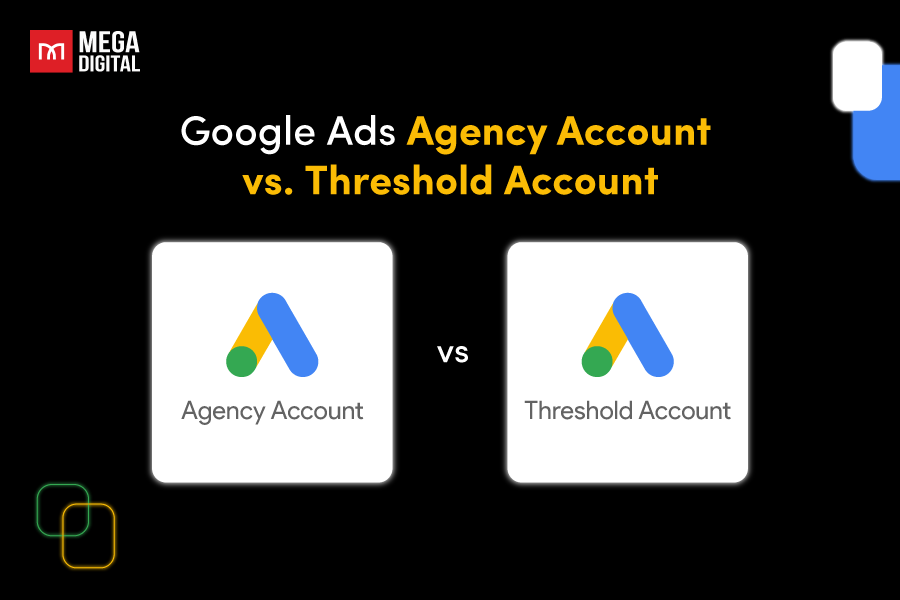Broad match keyword is the default match type for all your keywords as it encompasses the widest range. Hence, there’s no need for you to specify another match type such as exact match, phrase match, or a negative match type. Curious to explore further about broad match? There’s a fascinating article waiting for you below!
Learn more: Exact Match Keywords: The Ultimate Guide for Effective Advertising
What is broad match keyword?
Broad match keyword is the keyword match type that allows your ads to reach a larger audience without forcing you to create a lengthy keyword list.
For instance, suppose you have the broad match keyword automobile window repair. Even though it does not include any of the words as your keyword, it can reach searches such as automotive glass replacement because they are related to the query.
The syntax for the broad match keyword is just to enter the keyword. Here’s an example of broad match keywords:

Benefits of broad match keyword
Broad match keywords in Google Ads come with a host of compelling advantages.
1. Increasing visibility across various search queries
Broad match keyword isn’t just about reaching audiences; it’s about dominating the digital landscape. It expands your ad’s reach beyond selected keywords, capturing diverse variations and related terms.
This comprehensive approach ensures your message connects with a wider audience, boosting your brand’s visibility and reaching potential customers you might have missed.
2. Discovering unexpected but relevant search terms
One of its most compelling benefits lies in its ability to unravel a treasure trove of new keywords. Broad match keyword functions as an explorer, navigating through the vast expanse of online searches. It uncovers hidden gems—variations and phrases relevant to your business—that might have remained undiscovered through a more limited approach.
This exploration isn’t just about expanding your keyword list; it’s a goldmine of valuable insights into consumer behavior and emerging market trends.
Leveraging these fresh keywords empowers you to refine your targeting strategy and stay ahead in a competitive landscape.
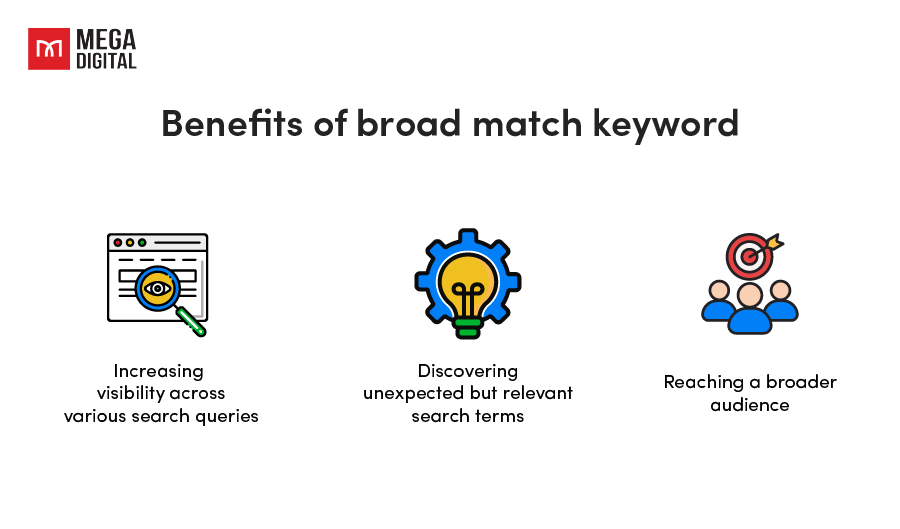
3. Reaching a broader audience
Broad match keywords in online advertising open the floodgates to a wider audience. It surpasses the constraints of specific keywords, ensuring your ad is displayed to a diverse range of potential customers. It casts a wide net across the digital landscape by encompassing variations, synonyms, and related terms.
This expansive reach means your brand is visible to individuals who might express interest using different search queries, maximizing exposure and connecting you with a more diverse audience base.
How to set up broad match keyword
As I said before, broad match keyword serves as the default match type for all keywords within Google Ads. When initiating a new keyword, employing a broad match is as simple as entering the keyword in plain text.
So, if you wish to transform existing exact or phrase match keywords into broad matches, follow these steps:
Step 1: Open audience setting
- Log in to your Google Ads account, and navigate to Campaigns.
- Select “Audiences, keywords, and content” from the section menu.
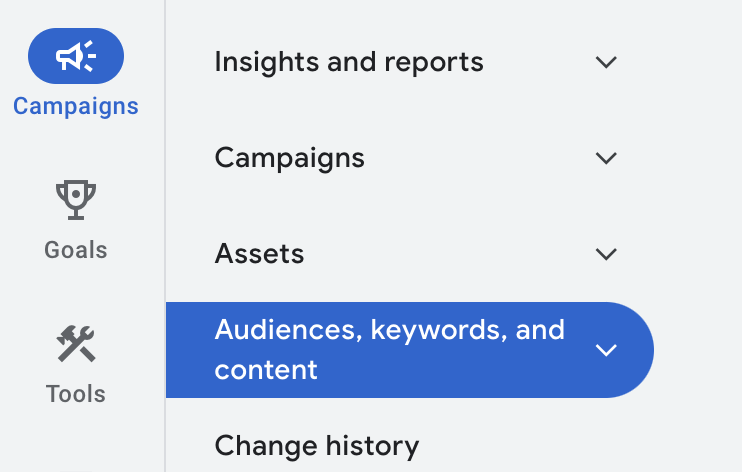
Step 2: Modify the match type
- Choose “Search keywords”, check the box next to the keywords you want to modify, click “Edit”, and select “Change match types”.
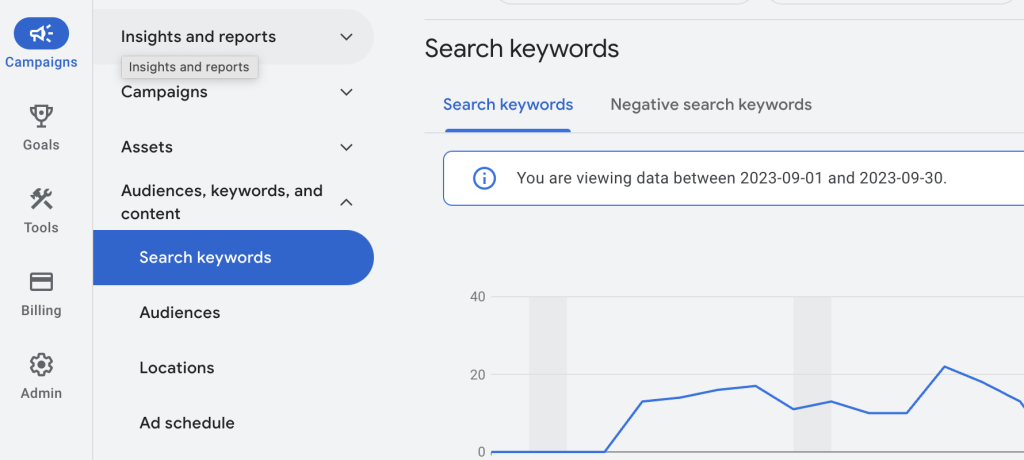
- Upgrade to broad match or choose “Change all match types” and specify “broad match”.
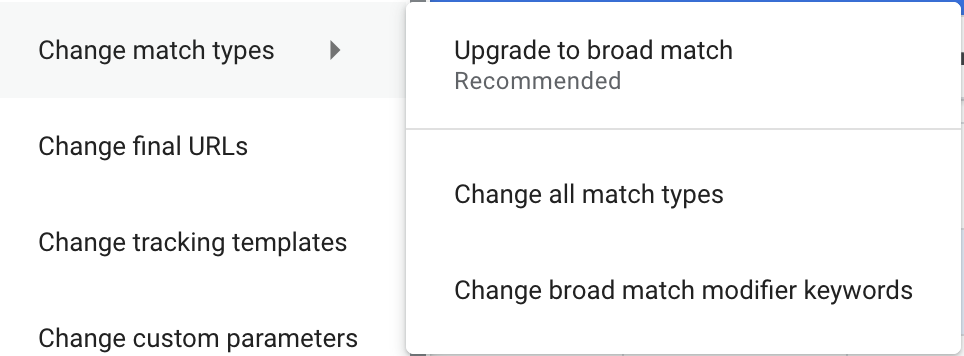
Step 3: Save changes
Confirm your changes by clicking “Apply”.
Mega Digital’s 5 tips to use broad match keyword in Google Ads effectively
This month, I’ve conducted over 30 campaigns using broad match, and the outcomes have been pleasantly surprising. Here are the insights I’ve gathered from these experiences.
1. Optimize negative keyword
Create a comprehensive list of negative keywords to filter out irrelevant searches and ensure your ads are shown to a more relevant audience. Regularly update and refine this list based on search term reports. Explore further into the various types of negative keyword match types for a more comprehensive understanding.
2. Organize keyword ad groups
Organize your broad match keywords into tightly themed ad groups. This allows for more tailored ad messaging and landing pages, increasing relevance and click-through rates.
3. Monitor constantly
Regularly review performance metrics and search term reports to identify which broad match keywords are driving valuable traffic. Adjust bids, add negatives, or refine your keyword list accordingly for improved targeting.
>>> Read more: 10 Google Ads Metrics You Need to Track Daily
4. Use modified broad match
Consider using modified broad match by adding “+” symbols to specific keywords within your broad match. This provides more control and ensures your ads are triggered for searches containing those particular terms.
5. Test and refine ad copy
Craft compelling ad copies that cater to various intents associated with your broad match keywords. Continuously test different ad variations to find the most effective messaging that resonates with your audience.
Broad Match vs Phrase Match, which is better?
Both Broad Match and Phrase Match are keyword matching options in online advertising that offer varying levels of targeting. We’ll delve deeper into these options to help you better understand their differences and guide you in deciding which one suits your needs best.
Match types analysis
According to data from Search Engine Land, there are 4 key takeaways:
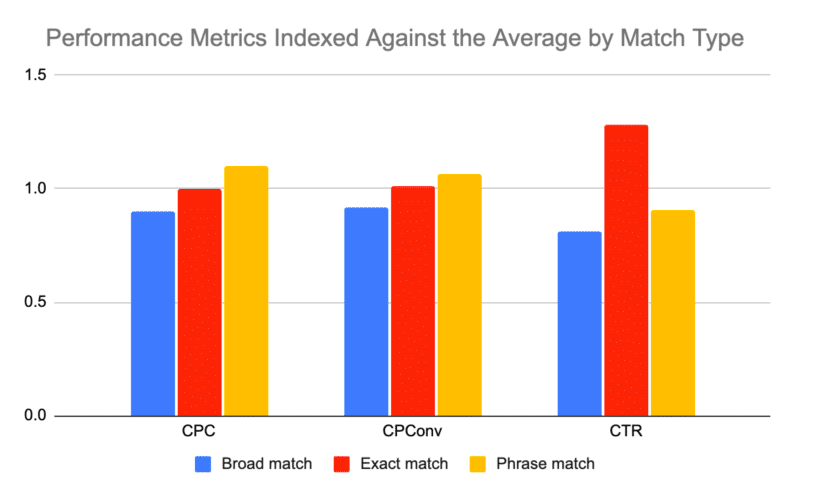
1. Broad match has the cheapest CPC
As expected, when you aim for a broader audience, there’s less competition, which usually means lower costs. The data backed this up, showing that the cheapest type of matching was nearly a dollar less than the others.
2. Exact match drives the highest CTR
This information aligns with the idea that the more precise your targeting, the more pertinent your ad becomes. Consequently, when the ad resonates more with consumers, it tends to generate a greater response rate.
3. Phrase match performs the worst, except for a slightly better click-through rate (CTR)
Unfortunately, phrase match faces challenges on multiple fronts—it records the highest CPC and cost per conversion. Despite having a slightly better CTR than broad match, it doesn’t offer a significant advantage or endorsement.
4. Broad match results in the lowest cost per conversion
This discovery was really surprising. Even though broad match gets cheaper clicks, it might not get as many people to buy things. But because it’s cheaper to get those people to visit, it ends up being the cheapest way to get someone to buy something.
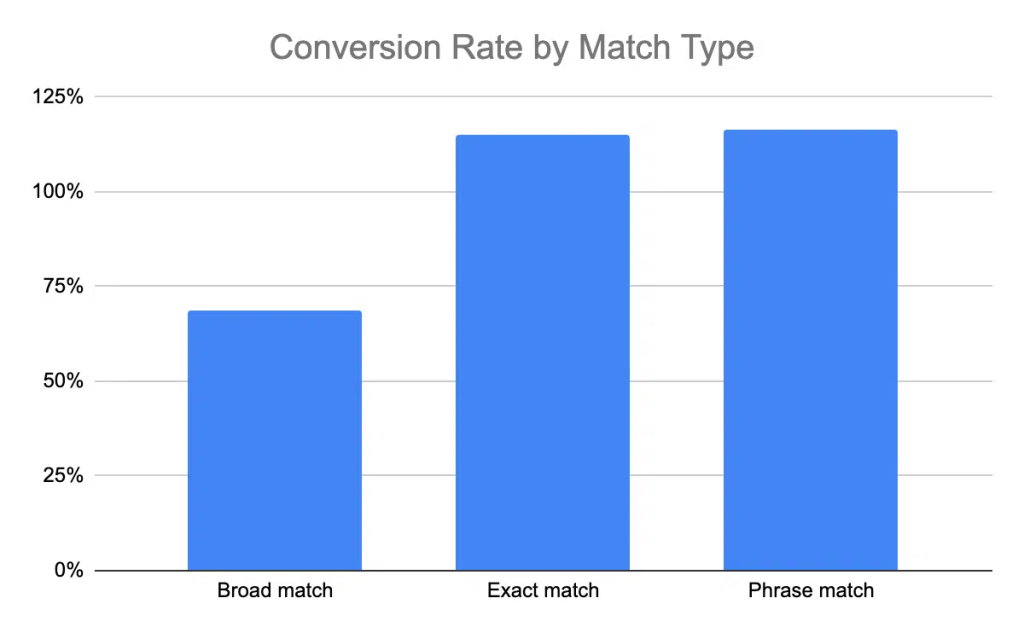
The data implies that performance has stayed relatively steady despite the implementation of additional AI tools. There isn’t a distinct sign that users or advertisers have altered their usage of these match types over time.
Learn More: How Much Does Google Ads Cost? Is It Worth Investing in?
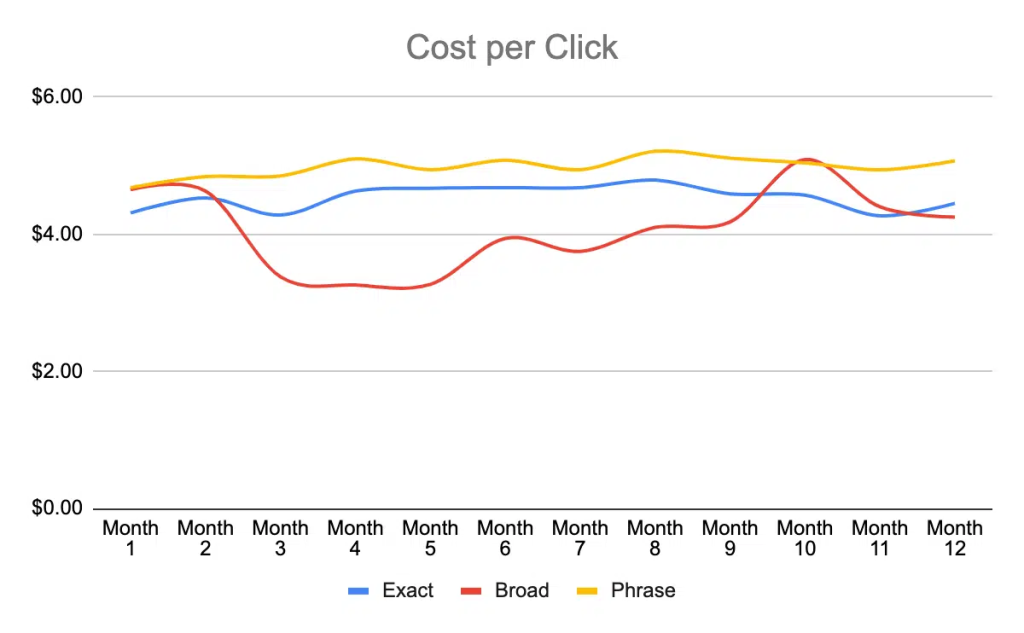
Which one is better?
First and foremost, here’s a detailed table outlining the differences between broad match keyword and phrase match keyword in Google Ads.
| Aspect | Broad Match | Phrase Match |
|---|---|---|
| Match Type | Matches a wide range of related searches | Matches specific phrases or variations of the phrase |
| Keyword Example | running shoes | “running shoes” |
| Search Queries | Triggers ads for a broad spectrum of queries | Triggers ads for searches containing the specified phrase |
| Keyword Variations | Matches synonyms, misspellings, related terms | Matches the specified phrase in the exact word order |
| Ad Relevance | May show ads for less relevant but related queries | Usually more targeted, showing for more relevant queries |
| Control | Offers less control over specific search intent | Provides more control by specifying a phrase to target |
Determining whether Broad Match Keyword or Phrase Match Keyword is better largely depends on your advertising goals, strategy, and the specific context of your campaign.
- For Brand Awareness and Reach: Broad match can be beneficial as it maximizes exposure to a wide audience, increasing visibility and potentially attracting new customers.
- For Specific Targeting: Phrase match allows for a more controlled targeting approach, ensuring your ads are shown to users searching for more specific phrases related to your business.
The Best Approach: A combination of both match types often yields the best results. Begin with a mix of broad and phrase match keywords, continuously monitoring their performance. Gradually refine your strategy based on data from search term reports, adjusting bids, adding negative keywords, and optimizing your keyword lists to strike a balance between reach and relevance.
Wrap up
Understanding the significance of broad match keyword is crucial. They act as catalysts for broadening your ad’s reach, capturing varied search intents, and increasing brand visibility. Combining both broad and phrase-match strategies allows for a comprehensive approach. Effectively leveraging broad match keyword involves continual monitoring, refining keyword lists, and using negative keywords to enhance targeting.








